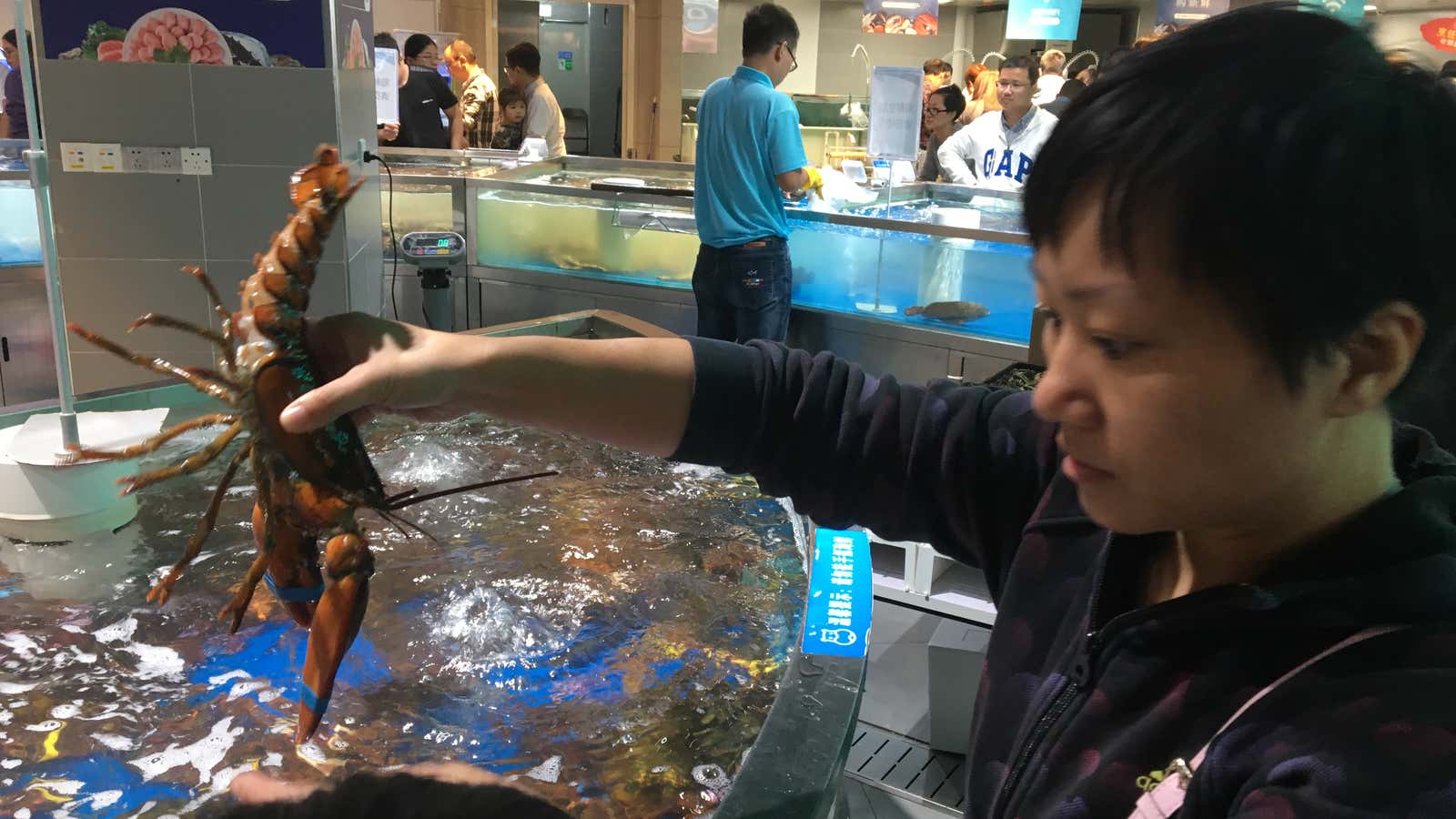On Nov. 19, Alibaba announced it had invested $2.9 billion in Sun Art Retail, the Chinese hypermarket chain partially owned by French retail conglomerate Auchon (which upped its stake to 36% to match Alibaba’s holding).
The investment into Sun Art, which operates nearly 450 giant supermarkets across the country, marks the continuation of the e-commerce giant’s foray into selling groceries. Throughout the past year Alibaba has opened a handful of supermarkets across China under its wholly-owned Hema division. Before that, it had been spending aggressively on discounts and logistics infrastructure for Tmall Supermarket, its online grocery store. These initiatives parallel those from US e-commerce giant Amazon, which has expanded its Amazon Fresh online grocery delivery service, and also purchased Whole Foods this year for $13.7 billion.
Both companies may be correctly predicting that offline shopping is the next frontier of online shopping, and that buying groceries is ripe for disruption. China’s grocery market has an estimated value of $1.5 trillion. Alibaba says its focus is on better meshing the online and offline shopping experience, for instance, by improving inventory management and delivery services.
But due to China’s history of serious lapses regarding food safety—and the resulting skittishness many in the country have around food—this bet comes with more risks for Alibaba than for its US-based counterpart.
China’s most infamous food safety scandal occurred in 2008, when at least six infants died and hundreds of thousands fell sick after consuming baby milk formula that suppliers laced with melamine. Countless other scandals have surfaced since then. The share of people saying food safety is a very big problem went from 12% in 2008 to 40% in 2016, according to a Pew Research survey.
At times, established brands have taken a hit from food safety-related scares.
In 2014, a Shanghai news outlet reported that a supplier had been repackaging old chicken and beef and selling it to KFC and McDonalds in China. Both chains apologized and severed ties with the supplier, subsidiaries of the US-based OSI group, but still faced a consumer and media backlash that dogged them for years. OSI, which was prosecuted and fined millions in China, disputes that it sold substandard products and says it was a victim of a smear campaign (paywall).
Walmart in China suffered in 2014 when tests revealed that the retailer had been selling donkey meat (which is common in China) tainted with fox meat (which is not). The company quickly issued a recall of the product.
Widespread consumer panic over food means “fake news” about food safety can also spread rapidly—and be just as damaging to businesses as real scandals. Earlier this year, reports about plastic seaweed caused wholesale prices in a key hub to drop by more than 50%—even though the news was made up. State media will also use food safety as a theme for politically-motivated smear pieces. In 2011, government-affiliated broadcaster CCTV aired a segment alleging that Japanese retailer Muji sold food in China from areas affected by the Fukushima flooding. Muji disputed the claims and provided China-approved import documentation regarding the origin of the food.
As a tech company, Alibaba is arguably well-placed to weather the risks inherent for food retailers in this environment, perhaps more so than most other companies.
Alibaba said in a statement that Sun Art’s grocery brands “adhere to global best practices on food safety in China and around the world.” For its own Hema supermarkts, the company says it has “robust vetting and monitoring systems” in place, works only with certified suppliers, and tracks food from farms to consumers. “Consumers… can get all the product origin and history by scanning the QR codes on individual products,” it added.
Last spring Alibaba launched a program using blockchain to track and verify the authenticity of imported Australian beef. Rival Chinese e-commerce company JD and Walmart are also using blockchain to manage food safety.
But China’s supply chains across many industries remain difficult to control completely, and buyers know that. A company that can convince consumers that the food they’re buying has been thoroughly vetted would occupy a highly profitable niche in this market. Perhaps that will be Alibaba.
